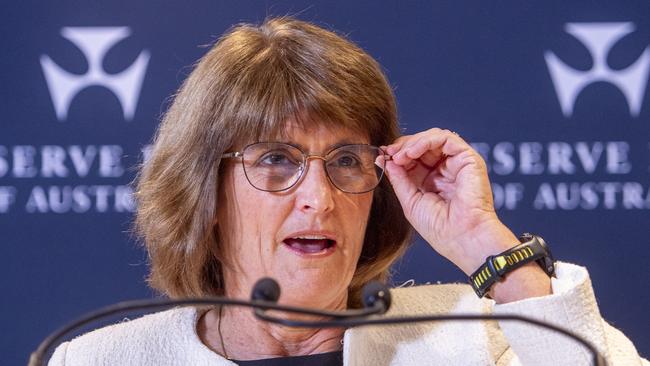IMF backs RBA, warns against govt spending spree
The UN-linked agency has warned against expansionary government policies that could thwart the RBA’s management of ‘the final descent of inflation to target’ as external challenges loom.

The International Monetary Fund has thrown its backing behind the Reserve Bank’s current restrictive monetary stance, labelling it “appropriate” and calling for support with fiscal policy “that avoids an expansionary stance”.
The warning against extensive public spending that has propped up economic activity comes as Australia remains on a narrow path to a soft landing, with risks tilted to the downside, the IMF said in its overnight assessment report.
The show of support from a specialised agency linked to the United Nations comes after the central bank, led by governor Michele Bullock, kept rates steady at a 13-year high of 4.35 per cent at its December meeting, despite union pressure to cut rates, but softened its tone.
Minutes of the December meeting, released on Tuesday, noted “underlying inflation was still too high, underpinned by persistently high services price inflation”.
The IMF is projecting a gradual pick-up in Australia’s growth, from 1.2 per cent in 2024 to 2.1 per cent in 2025, but there is significant uncertainty surrounding the macroeconomic outlook and the balance of risks is tilted to the downside.

On the domestic front, persistent labour market tightness, stronger than expected fiscal impulses and lower spare capacity than currently assessed could contribute to stalling the disinflation process, “potentially leading to higher-for-even-longer interest rates that adversely impact consumption and investment”, the IMF warned.
External risks include weakness in major trading partners, geoeconomic fragmentation affecting global trade, and rising shipping costs and volatile energy and food prices amid escalating geopolitical tensions, which could also complicate the disinflation process.
The IMF has called for near-term policies that focus on “managing the final descent of inflation to target (of 2-3 per cent)” – expected only by the end of 2025 – while nurturing growth.
Over the medium term, broader tax and expenditure policy reforms should reduce structural deficits, promote economic efficiency, and safeguard long-term fiscal sustainability.
Specifically on housing, the agency said a comprehensive policy package is essential to tackle the affordability crisis, focusing on increasing the construction workforce, relaxing zoning regulations, advancing initiatives to boost new housing supply, and re-evaluating property taxes and stamp duty.
“Efforts to rejuvenate Australia’s productivity growth should be prioritised,” the IMF said.
“Focus should be given to competition policy, reforms in capital and labour markets, and opportunities presented by AI technologies.”





To join the conversation, please log in. Don't have an account? Register
Join the conversation, you are commenting as Logout